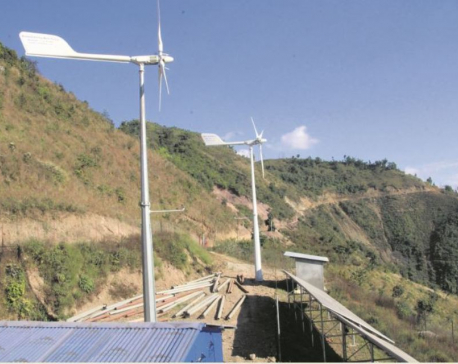
OR
Cabinet endorses revised targets on combating Climate Change
Published On: December 9, 2020 02:28 PM NPT By: Republica | @RepublicaNepal

KATHMANDU, December 9: A Cabinet meeting on Tuesday has approved the revised targets on combating climate change as part of the Paris Agreement (2015).
The "Enhanced Nationally Determined Contributions(eNDC) of Nepal," which sets out Nepal's commitment toward minimizing the impact of climate change and its vision towards net-zero greenhouse gas emissions and a resilient economy, was approved by the cabinet.
Parties to the Paris Agreement, including Nepal, last year had agreed to submit their revised targets to the UNFCCC within December 2020. A ministry level task force, headed by the Climate Change Coordination Division Chief, under the Ministry of Forest and Environment(MoFE) had prepared the strategic document before submitting it to the cabinet.
With its goals of decarbonizing economies and improving resilience, the Paris Agreement established the NDC as the primary policy tool for global action for climate change.
"The enhanced NDC was approved by the Cabinet," Dr Radha Wagle, chief of Climate Change Coordination Division, under the Ministry of Forest and Environment(MoFE), said.
In its major target relating to clean energy based transport sector, the government plans to increase sales of e-vehicles so that 90 percent of all private passenger vehicle sales, including two-wheelers, would be electric, and 60 percent of all four-wheeler public passenger vehicle sales would be electric by 2030, in its medium term target.
The government hopes that the policy would help to decrease Nepal's fossil fuel dependency by 28 percent.
As part of the short-term target, 25 percent of all private passenger and 20 percent of all four-wheeler public passenger vehicle sales would be electric by 2025.
It may be recalled that the current share of electric vehicles in Nepal stands around one percent, against the NDC-16 target of increasing it to 20 percent.
Also, by 2030, the government plans to develop 200 kms of electric rail network to support public commuting and mass transportation of goods.
In the medium term target related to residential cooking, the plan wants 25 percent of all households to use electric stoves as their primary mode of cooking. Currently, around five percent of households is estimated to use electric induction stoves, either as primary or secondary mode of cooking .
In its energy target, Nepal seeks to expand clean energy generation from approximately 1400 MW to 15,000 MW by 2030. Of the total generation, five to ten percent would be generated from mini and micro-hydro power, solar and wind energy.
In its Agriculture, Forestry and Other Land Use (AFOLU) related target, the plan seeks to maintain 45 percent of the total area of the country under forest cover. Nepal has made progress on increasing the total forest coverage to 44 percent, against the NDC-16 target of 40 percent.
On industry targets, the government is seeking to formulate guidelines and establish mechanisms to monitor emissions from large industries by 2025. Also by 2030, the government aims to reduce coal consumption and air pollution from brick and cement industries through development of emission standards.
On waste management, the government seeks to treat 380 million liters of wastewater before discharging it to the natural course. Also, it seeks to manage 60,000 cubic meters of fecal sludge every year . Currently 2.1 percent of waste water and less than one percent of the fecal sludge is treated in Nepal, according to the official figure.
Though Nepal's contribution to global greenhouse gas emission is negligible--only 0.027 percent of the global total--Nepal ranks fourth in the global climate risk index of the most vulnerable countries.
You May Like This

Palpa village generates electricity from wind energy
PALPA, Jan 28: A village in Palpa has started generating electricity from wind energy to supply power to more than... Read More...

Govt decides to establish Defense University in Kavre
The government has decided to establish Defense University at Perungedanda of Banepa Municipality of Kavrepalanchok district. The recent meeting of... Read More...

Alumni members of Harvard University demand immediate release of Dr Roop Jyoti
KATHMANDU, Nov 14: Nepali students and alumni members of Harvard University on Thursday urged the government to release Roop Jyoti... Read More...




_20220508065243.jpg)
Just In
- MoHP cautions docs working in govt hospitals not to work in private ones
- Over 400,000 tourists visited Mustang by road last year
- 19 hydropower projects to be showcased at investment summit
- Global oil and gold prices surge as Israel retaliates against Iran
- Sajha Yatayat cancels CEO appointment process for lack of candidates
- Govt padlocks Nepal Scouts’ property illegally occupied by NC lawmaker Deepak Khadka
- FWEAN meets with President Paudel to solicit support for women entrepreneurship
- Koshi provincial assembly passes resolution motion calling for special session by majority votes













Leave A Comment